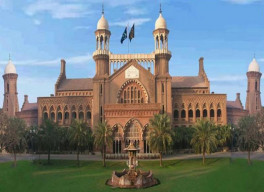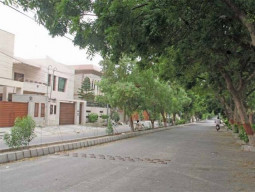
The federal cabinet on Tuesday decided that the government would not acquire land from locals for the construction of housing societies "unlike the policy in the past".
“The prime minister’s discretionary powers to allot plots would be abolished,” Federal Information Minister Fawad Chaudhry said at a news conference following a meeting of the cabinet.
“From now on, only federal government employees would be eligible for all the housing schemes to be launched by the Federal Government Housing Foundation.”
The cabinet meeting, chaired by Prime Minister Imran Khan, also expressed its concerns over the irregular allotments of plots to the employees of various institutions. It approved the formation up of a committee headed by Federal Minister Shireen Mazari and comprising representatives of the housing and finance ministries and Establishment Division to formulate an allotment policy for government employees.
Fawad said the cabinet, on the request of the housing ministry, had given the nd to amendments to the Rules of Business, 1973 to enable the ministries of foreign affairs and defence to solely look after their buildings.
“If both the ministries want to start a new project, they would have to take an NOC [no-objection-certificate] from the housing ministry,” he added.
“The ministry was also allowed to outsource their buildings to private companies for maintenance.”
The cabinet was given a detailed briefing on the comparison of the prices of commodities with those in other regional countries and assured that the rates in Pakistan were the lowest in the region.
Fawad said the fuel prices in Pakistan were still the lowest in comparison with non-oil producing countries.
The minister maintained that the wheat flour price in Pakistan was Rs60.9 per kg while it stood at Rs83 in India and Bangladesh. “In Afghanistan, it is around Rs73 per kg.”
Similarly, the price of gram pulse per kg in Pakistan was Rs146.77. In India, it was being sold at Rs166 and Rs224 in Bangladesh.
The price of Mash lentil in the country was Rs245.84, while in India, Bangladesh, and Afghanistan, it stood at Rs244, Rs334 and Rs214, respectively, he claimed.
The minister maintained that the price of onion in Pakistan was Rs47.14 per kg. In India and Bangladesh, it is Rs95 and Rs121, respectively.
The price of chicken in the country was 254.92 per kg. In India and Bangladesh, it is being sold at Rs438 and Rs324, respectively.
He said in Pakistan, the price of petrol was Rs138.73 per litre. In India and Bangladesh, it was Rs258 and Rs180 per litre.
Read More: CDA notifies illegal housing societies
Fawad said the poverty level in those countries with whom the comparison was being made was higher than that in Pakistan as per latest the World Bank report.
Drawing inter-provincial comparison of edibles, he said in Rawalpindi, a 20-kg wheat flour bag was available at Rs1,100, whereas in Karachi its price was Rs1,470.
He added that the sugar price in Rawalpindi was Rs90 per kg, whereas in Karachi it was being sold at Rs120 per kg.
He claimed that the price of Mong lentil was Rs148 per kg in Punjab, In Karachi, he added, its rate was Rs196.
He lashed out at the Sindh government for failing to control the prices of commodities and asked PPP Chairman Bilawal Bhutto Zardari to hold a protest against inflation next time before the Sindh’s Chief Minister House instead.
Fawad said the Sindh government needed to improve its governance so that people of the province could have some relief amid the rising inflation.
The minister said the cabinet had rejected the proposal to suspend duty on vintage cars import for one year.
He added that He said the ministries of commerce and information and had given a presentation to the cabinet on their vacant posts.
He said PM Imran had with the coalition partners after chairing the cabinet meeting and took them into confidence on the government’s stance on the Election Commission of Pakistan (ECP) in the backdrop of electoral reforms.
The minister said there was a consistent position of the government on the electoral system, which needed to be reformed for ensuring free and fair polls and strengthening democracy in the country.
Sources said the cabinet was also informed that the agreement reached with the Tehreek-e-Labbaik Pakistan (TLP) would be fully implemented and its chief Saad Rizvi would be released soon.
They added that the prime minister had appointed Foreign Minister Shah Mahmood Qureshi as the focal person on the TLP and the agreement.
Announcing other decisions of the cabinet, Fawad said Pakistan Steel Mills (PSM) CEO Brigadier (retd) Shuja Hassan had been given an extension of one year.
A new board has been formed in Sheikh Zaid Medical Institute Lahore. The members include Professor Sajid Maqbool, Dr Rashid Nadeem, Naeem Siddiqui, Syed Naveed, Amjad Andrabi, Sharmeen Ahmer Khan, Umair Umer Virk and Niaz A Malik.
Amina Irfan and Farhana Azeem will be the members of a new board set up for the Pakistan Institute of Medical Sciences.
He said the cabinet had also approved the laying down of 41 recommendations, formulated by the International Labour Conference, for labourers in parliament. The minister said the ex-officio directors had been nominated for 13 companies under the Ministry of Energy (Petroleum Division).
The additional charge of the CEO of the Central Power Generation Company and Lakhra Power Generation Company has been given to Muhammad Salman Malik and Tanvir Ahmed Jafri, respectively.
He said an advertisement was being floated for the appointment of CEO Faisalabad Electric Supply Company.
Lt Gen (retd) Javed Mahmood has been appointed the rector of the National University of Sciences and Technology (NUST).
Engineer Rehan Abdul Baqi, the vice chancellor of the Institute of Space Technology, has been appointed a member of the Pakistan Engineering Council from 2021 to 2024.
The minister said the support price of wheat has been discussed in detail at the meeting. Senior cabinet members including Shah Mahmood Qureshi, Hammad Azhar, and Khusro Bakhtiar have been appointed members of a committee formed to review the support price of wheat.
He said a new Federal Government Properties Management Authority was being formed to manage the Centre’s immovable assets through public-private partnership.
The minister said the cabinet had approved an ordinance that would provide legal cover to all progarammes operating under the Ehsaas Programme umbrella. Fawad said the prime minister would address the nation on Wednesday (today) to take them into confidence on important decisions for further improving economy. He would also announce a mega relief package which would eventually facilitate around 53% of the country’s population.
Doctor Inayat Husain has been appointed as Deputy Governor of the State Bank. The cabinet, he said, had given the nod to amendments to the Pakistan Nursing Council Act to bring reforms in its administrative affairs.
The minister clarified that the authority given to the president of the country to remove the National Accountability Bureau (NAB) chairman was not subservient to the prime minister's advice. He added that the government had filed a case with the Supreme Judicial Council (SJC) against a former NAB chairman in the past. “the Supreme Court had declared that as it was not a constitutional nomination, the SJC could not take notice of it.”
Therefore, in the wake of those remarks, the government had to give the power for removal of the chairman to someone, so it was delegated to the president of the country.
The minister said this was a “judicial authority” of the president, so he could exercise it at his own discretion.
(With input from APP)



1731329418-0/BeFunky-collage-(39)1731329418-0-165x106.webp)



1731771315-0/images-(3)1731771315-0-270x192.webp)













COMMENTS
Comments are moderated and generally will be posted if they are on-topic and not abusive.
For more information, please see our Comments FAQ